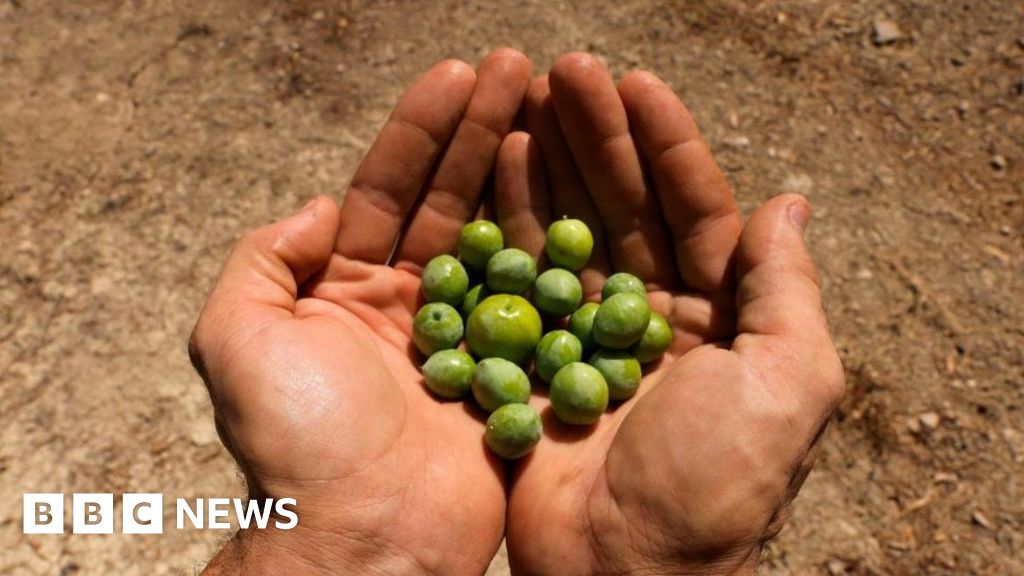- By Guy Hedgecoe
- BBC News, Jaén
Francisco José García de Zúñiga says Spain’s olive farmers are having yet another bad year
Francisco José García de Zúñiga is looking across one of the fields of olive trees that he farms. It’s harvest time, and the hum of the machine used to shake the trees as workers beat the olives off their branches can be heard in the distance.
“This is turning out to be another bad year, to put it mildly,” he said. “We’ve had two years of drought in a row, 2022 and 2023, and two years of bad harvests.”
Mr García de Zúñiga’s land is in Jaén, the southern inland province that is the heart of Spanish olive oil output.
Spain is the world’s biggest olive oil producer, covering 70% of European Union consumption and 45% of that of the entire world.
The lack of rain that this province and other olive-producing areas around Spain have been seeing therefore has an enormous impact on both the amount of oil being produced and its price.
“When Spain has problems, that creates problems for global production,” Mr García de Zúñiga said. “If the world supply is lower because Spain is producing less and the demand remains the same, the price goes up – it’s the law of supply and demand.”
In Spain, olive oil prices have increased by more than 70% this year alone after a sharp rise in 2022. A one-litre bottle of extra virgin oil currently costs around €9 ($9.88; £7.79) in low-budget supermarkets. A slight drop in the market price in recent weeks is only providing light relief.
The price of olive oil has skyrocketed because of increased production costs. including fuel, electricity and fertiliser
The Nuestra Señora del Pilar cooperative, through which hundreds of Jaén olive farmers produce their oil, is the biggest factory of its kind in the world. However, it only harvested 24 million kilos of olives in the 2022-23 season, one of the worst figures on record.
This year, the cooperative estimates the total will be around 30-35 million kilos – still well below the average.
Cristóbal Gallego Martínez, the president of the cooperative, says that increases in fuel, electricity and fertiliser costs over the last two years have contributed to the rise in the price of olive oil. However, he says the lack of rain is the biggest factor.
“We have a Mediterranean climate, which tends to have dry periods, periods of heavy rain and then intermediate spells,” he said. “Right now we’re in a dry period and it’s lasting a long time.”
Climate change means traditional assumptions that a poor harvest would be followed by a good one are no longer safe, particularly given that, according to a UN environment programme report, temperatures in the Mediterranean region are rising 20% faster than the global average.
Several parts of the country, including Andalusia in the south, have measures in place to reduce water use.
Mr Gallego Martínez says that the periods of both drought and rain are becoming more pronounced and he wants the national and local governments to implement measures to compensate, such as investment in irrigation systems.
The rise in the price of olive oil in Spain has been echoed across Europe. However, in some countries the increase has not been quite as sharp. A recent trend, for example, has seen Spaniards who live near Portugal crossing the border to buy slightly cheaper oil there.
Prices in the UK and Ireland have been noticeably lower than in Spain in recent months, even though they import its oil.
The reason is that those countries are likely to have bought the oil that is currently on their supermarket shelves several months ago, when the price was lower.
In Spain, where demand is extremely high, turnaround is much quicker.
Sixty-five percent of Spanish oil is sold abroad, although the industry is suffering a severe drop in exports this year.
Domestic sales are also down, with a 10% fall in consumption over the last year, according to government figures, as consumers use cheaper products instead such as sunflower oil.
However, experts warn that this is a false economy and that lower-cost alternatives mean losing out on a product that is at the centre of the famous Mediterranean diet, which also includes vegetables, pulses and fish.
“[Virgin extra] olive oil is the best thing a human can consume in order to prevent, or even treat, cardiovascular illness,” said Fernando López-Segura, of Córdoba’s Reina Sofía hospital and co-author of an investigation into the Mediterranean diet published in The Lancet last year.
“The quantity of oil that we recommend people consume is very small and the health benefits of it are huge,” he said.
However, it seems that rainfall, as much as health concerns, is currently deciding the amount of olive oil that people consume.

Robert Johnson is a UK-based business writer specializing in finance and entrepreneurship. With an eye for market trends and a keen interest in the corporate world, he offers readers valuable insights into business developments.








